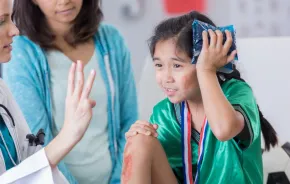There's a troubling trend in teen drug use today: According to a recently published presidential report on teen prescription drug abuse, new drug users ages 12-17 are just as likely to abuse prescription drugs as they are to use marijuana or other street drugs.
While street-corner drug deals still take place, teens who use prescription drugs to get high are now just as likely to score from their close friends and family members (whether knowing or unknowing) as they are from a dealer. And prescription drugs have one big advantage. "About 60 percent are getting their drugs from friends and family for free," according to Dr. H. Westley Clark, director of the U.S. Center for Substance Abuse Treatment, who says another 15 percent buy prescription drugs from friends.
Jayne Pelger, chemical dependency professional for Kent Youth and Family Services, says it's all too easy to get these drugs. "Kids either get prescription drugs for free or they can easily buy them. There are many teens who sell their own or other family member's prescription drugs."
Kids often believe prescription drugs are safer than street drugs, and Pelger often hears comments like, "It was only a couple of Vicodins. They were prescribed by a doctor, so they're safe."
The most abused
Pain relievers, such as OxyContin and Vicodin, are the most popular, followed by stimulants, tranquilizers and sedatives. "The effects of prescription drugs are different from alcohol and marijuana. Painkillers can produce a euphoric state of well-being. ADHD meds, such as Ritalin and Adderall, give a stimulant high, similar to cocaine. Tranquilizers and sedatives can produce a drowsy, calming effect," Pelger explains.
A 2006 University of Michigan survey of eighth-graders revealed a 100 percent increase of abuse of the popular pain-relieving drug OxyContin, and one in 10 high school seniors reported using Vicodin in the past year. The same study also found that five out of six drugs abused by high school seniors in the past year were prescription drugs or cough and cold medicines.
What are parents to do?
"It is important for parents to keep track of any medications in their homes -- this includes over-the-counter medications as well -- and talk with their teen immediately if they find anything missing," says Pelger.
According to the Partnership for a Drug Free America (PDFA), drug use and abuse happens in every kind of home, cutting across gender and economic lines, and in every region of the country. Talking to your child seems to be the best way to prevent or curtail drug abuse, but the talking shouldn't stop with just one conversation. A printable guide published by the PDFA titled, "Your Child Needs You: A Guide to Help Your Child Lead a Healthy, Drug-free Life" recommends that parents "take advantage of blocks of time, such as before school, on the way to practice or after dinner to discuss drugs and voice your 'no-use' expectation."
Additionally, the PDFA recommends helping your child figure out ways to deal with peer pressure. Have a brainstorming session to come up with a list of possible responses he feels comfortable saying and remind him that most people are focused on their own situation and are not as concerned with others' choices.
Your own history
If you find it hard to talk about drug use with your child because you yourself used drugs as a teen, it's time to get over it. The PDFA guide advises answering questions truthfully but stopping short of offering detailed accounts of your past exploits. Instead, focus on why you want to help your child avoid the same mistake. Use the opportunity to stress the dangers of drug abuse and your concern for your child's future.
It's especially important to recognize and treat prescription drug abuse in young teens, because abuse leads to a greater risk of developing dependency later in life, according to the presidential report. The sooner parents recognize the problem, the quicker the child can receive treatment and move forward with her life.
Jesse Michener lives in Tacoma, Washington, with her brood of three girls and funny husband. She serves as the education manager for the Broadway Center Conservatory (www.broadwaycenter.org) and knits, writes and takes pictures whenever she gets a chance. She has a blog at www.thefreelancemama.com.
Talking to your teen about drugs
- Drug abuse rarely happens without at least a few signs. Mood swings, depression, deteriorating relationships with family and friends, a change in personality, missing money or prescription drugs are all indicators something could be up. The PDFA suggests that you
- Hold a conversation when your child is not high or drunk, and when you can be calm and rational.
- Explain that your love and desire for your child's safety and well-being are the basis for your concern.
- Try to remain neutral and nonjudgmental.
- Tell your child that you've observed warning signs in her behavior that have made you concerned.
- Listen to everything your child has to say. If she brings up related problems, promise you'll address them later. Reiterate that what you are addressing at the moment is her drug use, which is a serious health issue and may be at the core of other problems.
- If you need help during this conversation, involve another family member, your child's guidance counselor, or a physician.
Resources
- "Your Child Needs You: A Guide to Help Your Child Lead a Healthy, Drug-free Life." The Partnership for a Drug-Free America (PDFA). www.drugfree.org
- Monitoring the Future (MAF). National Institute on Drug Abuse. 2006
www.monitoringthefuture.org - Teens and Prescription Drugs: An Analysis for Recent Trends on the Emerging Drug Threat. Office of National Drug Control Policy, Executive Office of the President. February 2007. www.theantidrug.com/pdfs/TEENS_AND_PRESCRIPTION_DRUGS.pdf
- "Emergency Department Visits Involving Dextromethorphan." The New DAWN Report, Issue 32. Substance Abuse and Mental Health Services Administration (SAMHSA). 2006. www.dawninfo.samhsa.gov









